Monday, January 28, 2008
Clinton or Obama? Who's Winning the Election on Web 2.0
Will Web 2.0 decide who wins the 2008 presidential election?
In the 1960 contest between John Kennedy and Richard Nixon, Kennedy's suave appearance next to Nixon's sickly pallor on that newfangled invention, the television, has been cited as a significant reason that Kennedy won instead of Nixon. Voters who listened to the two candidates on radio thought that Nixon won the debate, but those who watched on TV thought Kennedy the victor. Might we see the Internet play a similar role in 2008?
Voter Interest Metrics
Let's examine how well each of the candidates have used the Internet to promote their message.
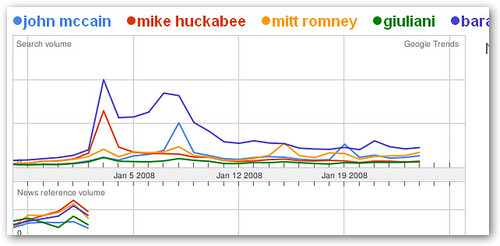
Judging by the Google Trends data, which indicate relatively how many searches are done for each candidate, Barack Obama is handily beating his competition (both Democratic and Republican). He's generated more interest from voters.
Republicans
On the Republican front, Mitt Romney has just overtaken John McCain on Google Trends, but Huckabee and Giuliani are still far behind.
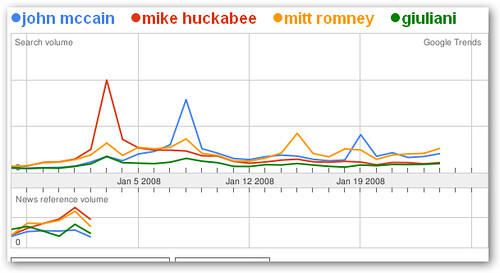
Democrats
We can also see that among Democrats, Obama and Hillary Clinton are running head to head with Edwards trailing.
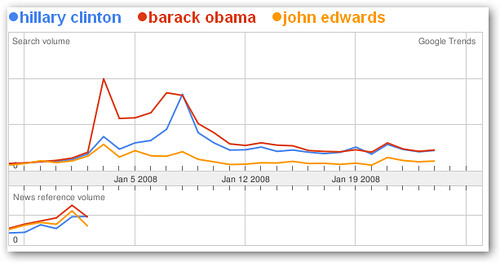
Website Popularity
What about site traffic? Who gets more voters to visit their websites?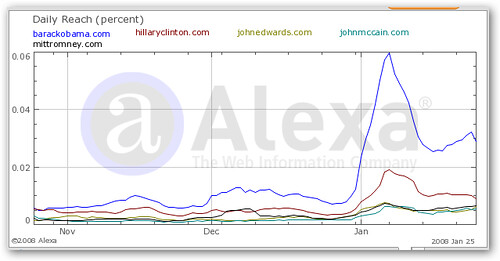
We can see from Alexa's Traffic History Graph that Obama once again leads Hillary Clinton by a factor of almost 3 to 1, trouncing Mitt Romney, John Edwards, and John McCain. Clearly Obama's message of change is getting more reception (at least among the technologically-adept, who tend to be the core users of the Alexa toolbar).
Why might this be?
Examining their respective websites, we can see that Obama and Clinton are very good at capturing the names, zip codes and/or email addresses of their visitors so they can keep spa-- informing them about the latest developments. The first time you visit Obama's site you see a lead capture form, a classic internet marketing tactic for getting repeat traffic. Romney isn't as direct about this, and McCain doesn't do it at all.
All except McCain effectively leverage social media with Facebook, MySpace, YouTube, and Flickr buttons featured on the homepage. The candidates also all tend to have some sort of private social network apart from their profiles on Facebook or MySpace.
SEO?
Dig deeper, however, and you'll find one of the reasons that Obama is winning the mindshare of Internet users. Obama's site is much more fully developed than Clinton's, much of it contributed by fans and supporters.
BarackObama.com has 502,000 web pages indexed by Google compared to 42,400 web pages at HillaryClinton.com. This means BarackObama.com has more than 10 times as much content visible to Google (and more active members perhaps) than HillaryClinton.com. It could also be that Clinton's website needs serious search engine optimization (SEO).
On the Republican side, JohnMcCain.com has 7,520 pages indexed compared to 7,350 pages for MittRomney.com. In this, at least, we can see that the Republican candidate's reputation for conservatism - or lack of content - shines true.
Facebook Effect
Could BarackObama.com's popularity be due to his more adept Web 2.0 skill? Diving deeper into the metrics, we see that out of the 502,000 web pages indexed by Google, 334,000 pages were social networking profiles hosted on the subdomain my.BarackObama.com, telling us that BarackObama.com's members are incredibly active and the significant reason he has a lead over HillaryClinton.com in terms of content. By contrast, Connect.HillaryClinton.com only has 37,600 pages indexed. It definitely doesn't hurt when you hire Facebook co-founder Chris Hughes onto your New Media staff.
Needless to say, McCainSpace and Team Mitt are disappointing in comparison.
SEM
What about search engine marketing (SEM)? Wouldn't it be nice to get visitors searching for information about you to come directly to your site?
Neither Clinton nor Romney are advertising on search engines like Google to get their message across to voters. Aside from McCain, only Obama is currently doing so on keywords like "obama" and "barack obama".
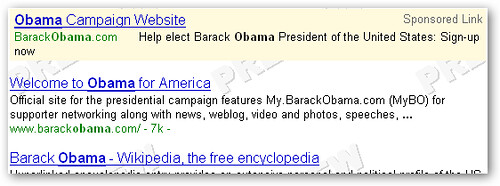
Free SEM advice: To really get clever, Obama should start running ads on keywords like "hillary clinton", "clinton", "romney", and so on and get those searchers to his website instead. Convert presidential comparison shoppers as they look for information on the opposition.
Conclusion?
Based on this preliminary analysis, Barack Obama is the definitive winner of the Web 2.0 game, engaging voters on multiple platforms to a much greater degree than opponents from either side of the aisle. Whether that changes from now to November depends on how seriously his opponents view Web 2.0 as a decisive medium for winning the presidential election.
Epilogue: Compared to Gallup
If Web 2.0 is changing the face of elections as much as television did to radio, can we still trust the old world polls like Gallup? Let's take a look at how our Web 2.0 results compare to the Gallup poll results of voter preference (before the South Carolina primary)? If Gallup is believed, McCain leads the Republican pack with a 10 point lead over Romney with Huckabee just behind. This of course runs contrary to our Google Trends results above which show Romney edging out McCain.
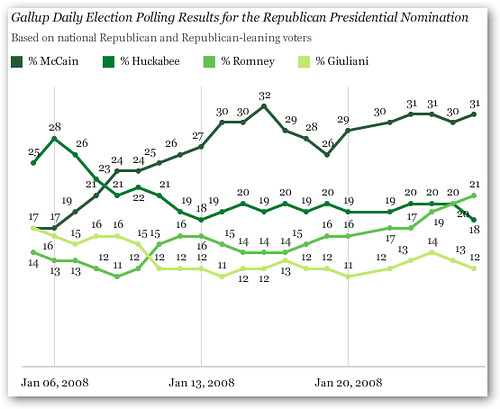
Among Democrats, Gallup shows that Clinton maintains a shrinking 13 point lead over Obama with Edwards still trailing widely. In Web 2.0 land, Obama has already overtaken Clinton.
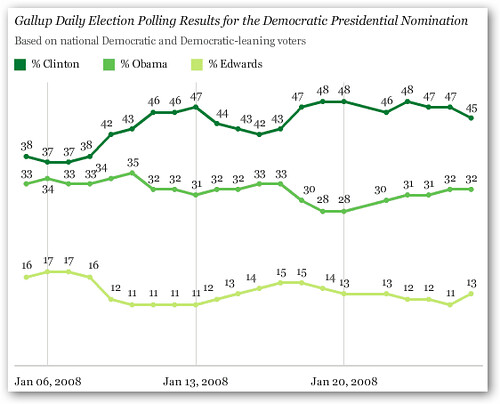
So traditional polls seem to indicate just the opposite of what we have uncovered. Is this another "radio/television discrepancy"? What do you think?
Labels: Technology








